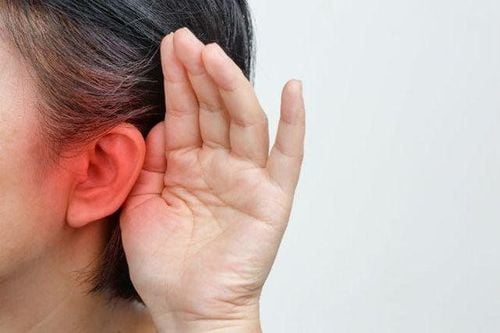This is an automatically translated article.
The article was professionally consulted by Dr. CCII Nguyen Van Thai - Department of Otolaryngology and Head and Neck Surgery, Vinmec Danang International General Hospital.Tinnitus is a buzzing sound in the ear that does not originate in the external environment and is distinguished from auditory hallucinations in schizophrenia or other psychiatric conditions. Tinnitus can be continuous or intermittent, tinnitus sounds include: bells, hums, whistles, hisses, growls, chicks chirps or other sounds...
1. Symptoms and classification of tinnitus
Although tinnitus is often uncomfortable, it is not usually a sign of a serious illness. Although the condition can get worse with age, for many people tinnitus improves with treatment. Treating one cause will improve tinnitus.
Tinnitus can be classified into 4 basic types:
Acute Tinnitus: Lasts from a few days to a few weeks, it is usually caused by ear infections, certain medications, pain in the outer ear, head and neck trauma, exposure. Prolonged loud noise, earwax and blood pressure, cardiovascular, metabolic diseases, in general, these diseases are usually identified and treated quite effectively, so tinnitus is often well resolved. Chronic Tinnitus: Lasts ≥ 3 months, may be due to the causes mentioned above, and often occurs in patients with hearing loss. Most cases of chronic tinnitus are difficult to cure completely, current treatments are only able to reduce the level of tinnitus to make the patient more comfortable with a long-term tinnitus control strategy suitable for the patient. each patient. Objective tinnitus: Doctors and people around can also hear tinnitus coming from the patient's ears, which may be caused by vascular abnormalities (congenital arteriovenous fistula), arterio-venous junctional tube Acquired vasculature, carotid tumor, carotid flow vortex, carotid stenosis, and pedal artery or loops such as anterior-inferior angioplasty (AICA) or posterior inferior anastomosis (PICA) ) auditory nerve compression or mechanical disorders such as eustachian tube abnormalities, spasms of the palatal muscles, temporomandibular joint disease, and stapes spasm. However, objective tinnitus is very rare, occurring in < 1% of all tinnitus cases. Most tinnitus is subjective. Subjective tinnitus: Only the patient can hear this tinnitus in the ear, which is commonly caused by exposure to too loud and prolonged noise such as industrial noise, gunfire, explosions or listening to music.
2. Causes of Tinnitus

Common causes of tinnitus :
Age-related hearing loss. For many people, hearing becomes poor with age, usually starting around age 60. Hearing loss can cause tinnitus. The medical term for this hearing loss is senile deafness (presbycusis). Exposure to loud noises. Loud noises, such as heavy equipment, chainsaws, and guns, are known causes of noise-related hearing loss. Portable music devices, such as MP3 players or iPods, can also cause noise-related hearing loss if music is played loudly for long periods of time. Tinnitus caused by short-term exposure, such as attending a loud concert; Both short-term and long-term exposure to loud sounds can cause permanent hearing damage. Congestion due to earwax. Earwax protects your ear canal by blocking dirt and slowing the growth of bacteria. When too much earwax builds up, it can cause hearing loss or irritate the eardrum, which can lead to tinnitus. Other less common causes of tinnitus :
Meniere's disease. Tinnitus can be an early sign of Meniere's disease, an inner ear disorder that can be caused by abnormalities in inner ear fluid pressure. Temporomandibular Joint Syndrome (TMJ). Problems with the temporomandibular joint, the joint on either side of the head in front of the ears where the lower jawbone meets the skull, can cause tinnitus. Head injury or neck injury. Head or neck trauma can affect the middle ear, inner ear, auditory nerve, or brain function related to hearing. Such trauma usually causes tinnitus in only one ear. Acoustic Schwannoma (Acoustic Schwannoma). This benign tumor grows on the cranial nerve that runs from the brain to the inner ear and controls balance and hearing. Also known as vestibular neuroma, this condition often causes tinnitus in only one ear. Muscle spasm in the inner ear. Muscles in the inner ear can tense up leading to tinnitus, hearing loss, and a feeling of fullness in the ear. This sometimes happens for no reason, but can also be caused by neurological diseases, including multiple sclerosis.
Vascular disorders associated with tinnitus:
In rare cases, tinnitus is caused by a vascular disorder. This type of tinnitus is called rhythmic tinnitus, causes include:
Atherosclerosis. With age and the accumulation of cholesterol and other deposits, the large blood vessels near the middle and inner ear lose some of their elasticity. That causes blood flow to become stronger, making it easier for the ear to detect a beat. Patients can often hear this type of tinnitus in both ears. Head and neck tumors. Tumors that press on blood vessels in the head or neck (angioma) can cause ringing in the ears and other symptoms. High Blood Pressure. High blood pressure and factors that increase blood pressure, such as stress, alcohol, and caffeine, can make tinnitus worse. Anomalies of capillaries. A condition called arteriovenous malformation, which is an abnormal connection between arteries and veins, can lead to tinnitus. This type of tinnitus usually occurs in only one ear. Medicines that can cause tinnitus :
Some medicines can cause or worsen tinnitus. Usually, the higher the dose of these drugs, the worse the tinnitus. Often the unwanted noise goes away when the person stops taking these medications. Drugs known to cause or worsen tinnitus include:
Antibiotics, including polymyxin B, erythromycin, vancomycin, and neomycin Cancer drugs.

3. Who is most susceptible to tinnitus?
Anyone can get tinnitus, but these factors can increase the risk:
Exposure to loud noises. Prolonged exposure to loud noises can damage the tiny hair cells in the ear that transmit sound to the brain People who work in noisy environments - like factory and construction workers, musicians and soldiers Soldiers are at higher risk than people in other jobs. Age: As we age, the number of active nerve fibers in the ear decreases, which can cause hearing problems commonly associated with tinnitus. Men are more likely to have tinnitus than women. Smoke. Smokers have a higher risk of tinnitus than non-smokers. Cardiovascular problems. Conditions that affect blood flow, such as high blood pressure or narrowing of the arteries, can increase your risk of tinnitus.
4. Complications of tinnitus
Tinnitus can significantly affect quality of life. Although it affects everyone differently, tinnitus can lead to complications such as:
Fatigue Stress Sleep problems Difficulty concentrating Memory problems Depression Anxiety and irritability . Treating complications may not be able to treat tinnitus, but it can help the person feel better.
Please dial HOTLINE for more information or register for an appointment HERE. Download MyVinmec app to make appointments faster and to manage your bookings easily.
Article references source: Mayoclinic.org, Webmd.com













